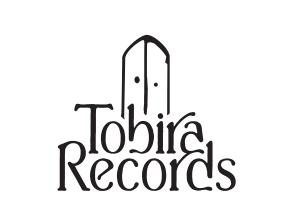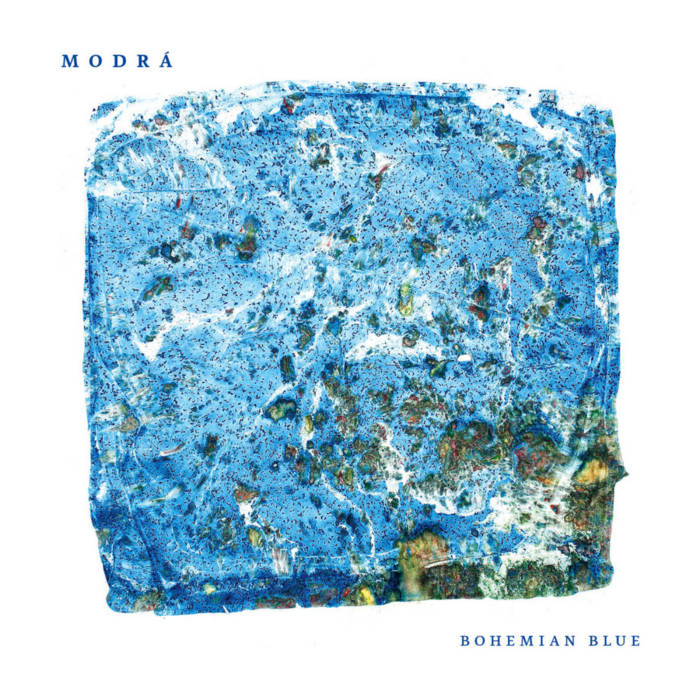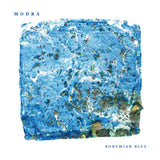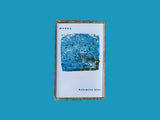Modrá // Bohemian Blue TAPE
- Availability:
1990-1991年にひっそりと活動していたチェコ・プラハの実験アンビエントトリオModráが、2024年5月にイギリスの再発専門レーベルInfinite Expanseからリリースした再発カセットです。(オリジナルは2018年リリース)
手作りのカリンバやプリペアードギター、テープコラージュなど用いた実験アンビエント〜ストレンジビーツ曲を収録。DLコード付属。
以下、レーベルによる解説です。
"90年代のプラハは変化と新しいエネルギーに満ちていた。ギャラリーでコンサートが企画され、人々は新進のバンドに興味をもって耳を傾け、新しい音楽の方向性が追求された。この時期、オルタナティヴアートへの関心が高まり、アンビエント、ニューエイジ、瞑想音楽の境界で活動する代表的なオルタナティヴバンド、リヒターバンドが登場した。80年代後半、控えめなギグを何年も続けた後、彼らのライブを見ることへの関心が高まり始め、バンドはチェコ地方だけでなく、海外にもツアーを敢行するようになった。
同じ頃、バイオリンとパーカッション奏者のヤロスラフ・コジャーンがグループを脱退し、独自の音楽を試み始めた。彼は、オルタナティヴロックグループのヴィーシ・ポプラールやアンビエント音楽のリヒターバンドで演奏し、手作りの楽器を作って演奏するなど、さまざまな音楽経験を持ち込んだ。フィドラーフォンは、アルミニウムのポットを組み立て、バネのついたスタンドに取り付けたユニークな楽器で、パヴェル・リヒターのエレキギターの繊細な音とユニゾンで演奏されると、リヒターバンドの特徴的なサウンドを形成した。
すでにサンプラーを所有し、ピアノも演奏していたが、ドラマーとして、水ガラスやポットから磁器の皿やサラダボウルまで、常に新しいパーカッシブな楽器や音を求めていた。1990年の夏、チェコ共和国の南ボヘミア地方にある国立公園、シュマヴァで木に釘を打ち込む実験を行い、最初の「シュマヴァ(村)・カリンバ」が誕生した。弟のミハエルとともに、カリンバを改良し、反復するメロディーをカリンバで試し、それを自宅で録音し、サンプラーのループやスローダウンしたテープで補った。
リズム、録音済みループ、ミハエル・コジャンのシンセサイザーが満載の新録音材は、1990年4月、ブラチスラヴァのクラリスキーコンサートホールで初めて人前で披露された。その直後、ヤロスラフは、プラハを拠点とする別のバンド、ディ・アルカのギタリスト、マレク・ハンズリークと出会い、Modrá(「青」)と名付けられた新しい音楽トリオの結成につながった。マレクのプリペアードギターが微妙なハーモニーと珍しいサウンドをリズム構造にもたらし、ヤロスラフ・コジャンのスローダウンされた録音済みテープ、サンプリングされたループや声がそれを補完する。
1990年11月から1991年6月にかけて、Modráはヤロスラフの自宅スタジオで数多くのレコーディングを行った。Bohemian Blueでは、この時期の最も興味深い作品を選び、1991年2月のホームコンサートでライヴ録音された2曲を加えた。このグループは1991年後半に解散し、短命に終わったが、音楽的実験の重要な時期であり、ヤロスラフ・コジャーンが現在も共演している新生オルロジ・スニヴチュ(「夢追い人の時計」)の幕開けとなった。"
レーベルその他作品はこちら /// Click here to see more Infinite Expanse releases available at Tobira.
----------------------
Includes DL code. C60 cassette in norelco case.
Recorded and mixed by Jaroslav Kořán, 1990-91, Pagoda Studio, Prague.
Remastered by Michal Kořán, 2018.
Tracklist:
1. Smalt Blue 05:20
2. Coffee Dark Blue 06:44
3. Afternoon Ultramarine (Ta naše jediná a nejlepší) 06:03
4. Evening Indigo 07:26
5. Prague Blue 03:06
6. Pub Cobalt 03:12
7. Smoke Green Blue 04:41
8. Night Denim 03:29
9. Morning Azure 05:22
10. Hyacinth Blue 01:48
11. Metal Blue 04:09
Text by Infinite Expanse:
"The nineties were full of changes and new energies in Prague. Concerts were organized in galleries, people listened with interest to emerging bands and new musical directions were followed. In this period, there was a growing interest in alternative art, and Richter Band, one of the leading alternative bands operating in the borders between ambient, new age and meditative music, was in its accession. After years of modest gigging in the late 80s, interest in seeing them perform live began to increase and the band started to tour not just the Czech regions but also ventured abroad.
At the same time, Jaroslav Kořán, a fiddlerophone and percussion player, left the group and began to experiment with his own music. With him, he brought a range of musical experience from playing in the alternative rock group, Vyšší Populár, and the ambient outfit, Richter Band, as well as building and playing hand-made instruments. The fidlerophone, a unique instrument assembled using aluminium pots and mounted on sprung stands, formed the characteristic sound of Richter Band when played in unison with the subtle sounds of Pavel Richter’s electric guitar, and would later inspire Jaroslav to experiment in creating his own instruments.
Although he already owned a sampler and played the piano, as a drummer, he was constantly seeking new percussive instruments and sounds, ranging from water glasses and pots to porcelain plates and salad bowls. In the summer of 1990, he experimented with nails hammered into wood in Šumava, a national park in the South Bohemian regions of the Czech Republic, and the first "Šumava (or village) kalimbas" were created. Together with his brother Michal, they refined the kalimbas, trying out repetitive melodies on them, which they would then record at home and supplement with loops from a sampler and slowed-down tapes.
The newly recorded material, full of rhythms, pre-recorded loops and Michal Kořán's synthesizer, was presented for the first time in public in April 1990 at the Klarisky concert hall in Bratislava. Soon after, Jaroslav met Marek Hanzlík, a guitarist from another Prague-based band, Die Archa, leading to the formation of a new musical trio named Modrá (“Blue”). This led to a fundamental musical shift, with Marek’s prepared guitar bringing subtle harmonies and an unusual sound to the rhythmic structures, complemented by Jaroslav Kořán's slowed-down pre-recorded tapes, sampled loops and voices.
Over November 1990 to June 1991, Modrá made a number of recordings in Jaroslav’s home studio. For “Bohemian Blue”, the most interesting pieces from this period were selected and supplemented with two compositions recorded live at a home concert in February 1991. Although the group was only short-lived, disbanding in the second half of 1991, it represents an important period of musical experimentation and marked the dawn of the nascent Orloj Snivců (“Horologe of Dreamers”), with whom Jaroslav Kořán still performs today."
Artist : Modrá
Label : Infinite Expanse
CAT No: IE12
1990-1991年にひっそりと活動していたチェコ・プラハの実験アンビエントトリオModráが、2024年5月にイギリスの再発専門レーベルInfinite Expanseからリリースした再発カセットです。(オリジナルは2018年リリース)
手作りのカリンバやプリペアードギター、テープコラージュなど用いた実験アンビエント〜ストレンジビーツ曲を収録。DLコード付属。
以下、レーベルによる解説です。
"90年代のプラハは変化と新しいエネルギーに満ちていた。ギャラリーでコンサートが企画され、人々は新進のバンドに興味をもって耳を傾け、新しい音楽の方向性が追求された。この時期、オルタナティヴアートへの関心が高まり、アンビエント、ニューエイジ、瞑想音楽の境界で活動する代表的なオルタナティヴバンド、リヒターバンドが登場した。80年代後半、控えめなギグを何年も続けた後、彼らのライブを見ることへの関心が高まり始め、バンドはチェコ地方だけでなく、海外にもツアーを敢行するようになった。
同じ頃、バイオリンとパーカッション奏者のヤロスラフ・コジャーンがグループを脱退し、独自の音楽を試み始めた。彼は、オルタナティヴロックグループのヴィーシ・ポプラールやアンビエント音楽のリヒターバンドで演奏し、手作りの楽器を作って演奏するなど、さまざまな音楽経験を持ち込んだ。フィドラーフォンは、アルミニウムのポットを組み立て、バネのついたスタンドに取り付けたユニークな楽器で、パヴェル・リヒターのエレキギターの繊細な音とユニゾンで演奏されると、リヒターバンドの特徴的なサウンドを形成した。
すでにサンプラーを所有し、ピアノも演奏していたが、ドラマーとして、水ガラスやポットから磁器の皿やサラダボウルまで、常に新しいパーカッシブな楽器や音を求めていた。1990年の夏、チェコ共和国の南ボヘミア地方にある国立公園、シュマヴァで木に釘を打ち込む実験を行い、最初の「シュマヴァ(村)・カリンバ」が誕生した。弟のミハエルとともに、カリンバを改良し、反復するメロディーをカリンバで試し、それを自宅で録音し、サンプラーのループやスローダウンしたテープで補った。
リズム、録音済みループ、ミハエル・コジャンのシンセサイザーが満載の新録音材は、1990年4月、ブラチスラヴァのクラリスキーコンサートホールで初めて人前で披露された。その直後、ヤロスラフは、プラハを拠点とする別のバンド、ディ・アルカのギタリスト、マレク・ハンズリークと出会い、Modrá(「青」)と名付けられた新しい音楽トリオの結成につながった。マレクのプリペアードギターが微妙なハーモニーと珍しいサウンドをリズム構造にもたらし、ヤロスラフ・コジャンのスローダウンされた録音済みテープ、サンプリングされたループや声がそれを補完する。
1990年11月から1991年6月にかけて、Modráはヤロスラフの自宅スタジオで数多くのレコーディングを行った。Bohemian Blueでは、この時期の最も興味深い作品を選び、1991年2月のホームコンサートでライヴ録音された2曲を加えた。このグループは1991年後半に解散し、短命に終わったが、音楽的実験の重要な時期であり、ヤロスラフ・コジャーンが現在も共演している新生オルロジ・スニヴチュ(「夢追い人の時計」)の幕開けとなった。"
レーベルその他作品はこちら /// Click here to see more Infinite Expanse releases available at Tobira.
----------------------
Includes DL code. C60 cassette in norelco case.
Recorded and mixed by Jaroslav Kořán, 1990-91, Pagoda Studio, Prague.
Remastered by Michal Kořán, 2018.
Tracklist:
1. Smalt Blue 05:20
2. Coffee Dark Blue 06:44
3. Afternoon Ultramarine (Ta naše jediná a nejlepší) 06:03
4. Evening Indigo 07:26
5. Prague Blue 03:06
6. Pub Cobalt 03:12
7. Smoke Green Blue 04:41
8. Night Denim 03:29
9. Morning Azure 05:22
10. Hyacinth Blue 01:48
11. Metal Blue 04:09
Text by Infinite Expanse:
"The nineties were full of changes and new energies in Prague. Concerts were organized in galleries, people listened with interest to emerging bands and new musical directions were followed. In this period, there was a growing interest in alternative art, and Richter Band, one of the leading alternative bands operating in the borders between ambient, new age and meditative music, was in its accession. After years of modest gigging in the late 80s, interest in seeing them perform live began to increase and the band started to tour not just the Czech regions but also ventured abroad.
At the same time, Jaroslav Kořán, a fiddlerophone and percussion player, left the group and began to experiment with his own music. With him, he brought a range of musical experience from playing in the alternative rock group, Vyšší Populár, and the ambient outfit, Richter Band, as well as building and playing hand-made instruments. The fidlerophone, a unique instrument assembled using aluminium pots and mounted on sprung stands, formed the characteristic sound of Richter Band when played in unison with the subtle sounds of Pavel Richter’s electric guitar, and would later inspire Jaroslav to experiment in creating his own instruments.
Although he already owned a sampler and played the piano, as a drummer, he was constantly seeking new percussive instruments and sounds, ranging from water glasses and pots to porcelain plates and salad bowls. In the summer of 1990, he experimented with nails hammered into wood in Šumava, a national park in the South Bohemian regions of the Czech Republic, and the first "Šumava (or village) kalimbas" were created. Together with his brother Michal, they refined the kalimbas, trying out repetitive melodies on them, which they would then record at home and supplement with loops from a sampler and slowed-down tapes.
The newly recorded material, full of rhythms, pre-recorded loops and Michal Kořán's synthesizer, was presented for the first time in public in April 1990 at the Klarisky concert hall in Bratislava. Soon after, Jaroslav met Marek Hanzlík, a guitarist from another Prague-based band, Die Archa, leading to the formation of a new musical trio named Modrá (“Blue”). This led to a fundamental musical shift, with Marek’s prepared guitar bringing subtle harmonies and an unusual sound to the rhythmic structures, complemented by Jaroslav Kořán's slowed-down pre-recorded tapes, sampled loops and voices.
Over November 1990 to June 1991, Modrá made a number of recordings in Jaroslav’s home studio. For “Bohemian Blue”, the most interesting pieces from this period were selected and supplemented with two compositions recorded live at a home concert in February 1991. Although the group was only short-lived, disbanding in the second half of 1991, it represents an important period of musical experimentation and marked the dawn of the nascent Orloj Snivců (“Horologe of Dreamers”), with whom Jaroslav Kořán still performs today."
Artist : Modrá
Label : Infinite Expanse
CAT No: IE12







